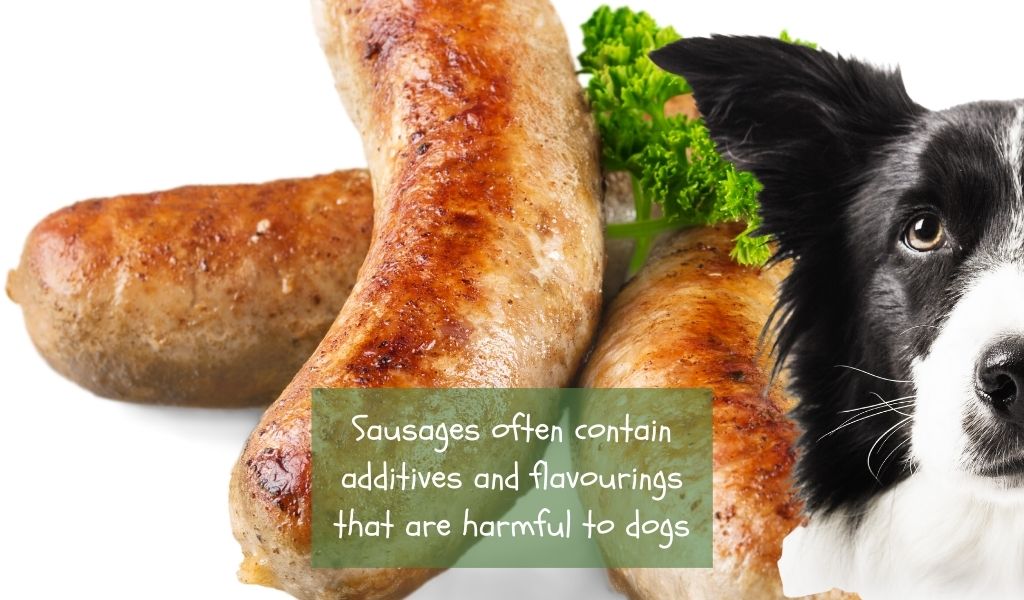If you’re a dog owner, you may have wondered whether or not it’s okay to give your pet a sausage.
After all, sausages are a popular food for humans, but can dogs safely consume them?
In this article, we’ll explore the topic of dogs and sausages, including the potential risks, benefits, and considerations for feeding your dog this popular food.
In general, it is not recommended to give sausages to dogs as they are often high in fat, salt, and other harmful ingredients. However, some types of sausages made from lean meats may be safe for dogs to consume in moderation as an occasional treat.
What are sausages?
Before we dive into whether or not dogs can safely eat sausages, it’s important to understand what sausages are.
At its most basic, a sausage is a type of meat product that is made by combining ground meat with various spices, herbs, and other ingredients.
The mixture is then stuffed into a casing and cooked or smoked, resulting in a flavorful, protein-packed food.
Can dogs eat sausages?
The answer to whether or not dogs can safely eat sausages is somewhat complicated.
In general, sausages are not the healthiest food choice for dogs, as they are often high in fat, salt, and other potentially harmful ingredients.
However, some types of sausages may be safe for dogs to consume in moderation.

What are the risks of feeding sausages to dogs?
Feeding your dog sausages can pose several risks to their health.
For one thing, sausages are often high in fat, which can lead to obesity and other health problems.
Additionally, many sausages contain a lot of salt, which can be harmful to dogs if consumed in excess.
Finally, some sausages may contain harmful ingredients like garlic or onion, which can be toxic to dogs.
What are the benefits of feeding sausages to dogs?
While sausages may not be the healthiest food choice for dogs, there are some potential benefits to feeding your pet this food.
For one thing, sausages are often high in protein, which is essential for maintaining healthy muscles and tissues.
Additionally, some types of sausages may contain beneficial vitamins and minerals that can support your dog’s overall health and wellbeing.
Sausages for dogs
What should you consider before feeding your dog sausages?
Before giving your dog sausages, there are several important considerations to keep in mind.
For one thing, you should be aware of the potential risks associated with feeding sausages to dogs, including obesity, high blood pressure, and other health problems.
Additionally, you should take into account your dog’s individual health needs and any existing medical conditions they may have.
What types of sausages are safe for dogs to eat?
While sausages can pose several health risks to dogs, there are some types of sausages that may be safe for dogs to consume in moderation.
When it comes to selecting sausages for your dog, it’s important to choose those that are made from high-quality, lean meats and that are free from harmful ingredients like garlic or onion.
Some safe options may include plain, cooked sausages made from chicken, turkey, or lean beef.
It’s important to note, however, that even these types of sausages should only be given to dogs in small amounts as an occasional treat, rather than as a regular part of their diet.
How much sausage can you feed your dog?
When it comes to feeding your dog sausages, moderation is key.
As a general rule of thumb, you should aim to give your dog no more than 10% of their daily calorie intake in the form of treats like sausages.
This will help to prevent obesity and other health problems.
Additionally, it’s important to cut sausages into small, bite-sized pieces before giving them to your dog, as this can help to prevent choking and other digestive issues.
Can feeding sausages to your dog cause pancreatitis?
One of the potential risks of feeding sausages to dogs is the development of pancreatitis, a serious condition that can be caused by the consumption of high-fat foods.
Pancreatitis occurs when the pancreas becomes inflamed, which can cause vomiting, diarrhea, and other symptoms.
While not all dogs will develop pancreatitis from eating sausages, it’s important to be aware of the potential risks and to limit your dog’s intake of high-fat foods like sausages.
What are the symptoms of pancreatitis in dogs?
If your dog develops pancreatitis, they may experience a range of symptoms, including vomiting, diarrhea, loss of appetite, and abdominal pain. In some cases, pancreatitis can be severe and may require veterinary treatment.
If you suspect that your dog may be experiencing symptoms of pancreatitis, it’s important to contact your veterinarian right away for advice and treatment.
What should you do if your dog eats a sausage?
If your dog eats a sausage, it’s important to monitor them closely for any signs of digestive issues or other symptoms. Additionally, you should contact your veterinarian for advice on whether or not your dog needs medical attention.
In some cases, your veterinarian may recommend monitoring your dog’s symptoms at home, while in other cases, they may advise bringing your dog in for an evaluation and treatment.
What are some alternatives to sausages for dog treats?
If you’re looking for a healthy, safe alternative to sausages for your dog, there are several options to consider. Some safe, nutritious treats for dogs may include:
Small pieces of cooked, unseasoned chicken or turkey
Carrot sticks or baby carrots
Apple slices (without the seeds)
Plain, unsweetened yoghurt
Green beans
By choosing healthy, nutritious treats for your dog, you can help to support their overall health and wellbeing while still giving them a tasty reward.
FAQs
Can dogs eat raw sausages?
No, it is not safe for dogs to eat raw sausages. Raw sausages can contain harmful bacteria and may also be difficult for dogs to digest.
Can dogs eat sausage rolls?
Sausage rolls are typically made with pastry and other ingredients that can be harmful to dogs. It’s best to avoid giving your dog sausage rolls.
Can sausages be used as a training treat for dogs?
While sausages can be a tasty treat for dogs, they are often high in fat and salt, which can lead to health problems if given in excess. It’s best to choose healthier, lower-calorie options for training treats, such as small pieces of cooked chicken or carrot sticks.
Can dogs with pancreatitis eat sausages?
Dogs with pancreatitis should avoid high-fat foods like sausages, as they can exacerbate the condition. Instead, it’s important to choose low-fat, easily digestible foods for dogs with pancreatitis.
What are some signs that my dog may have eaten too much sausage?
If your dog has eaten too much sausage, they may experience vomiting, diarrhea, abdominal pain, or other digestive issues.
Additionally, they may become lethargic or show signs of discomfort. If you suspect that your dog has eaten too much sausage, it’s important to contact your veterinarian for advice.
Conclusion and final thoughts
In conclusion, while sausages may be a popular food for humans, they are not always the best choice for dogs. While some types of sausages may be safe for dogs to consume in moderation, others can pose serious health risks.
Before giving your dog sausages, it’s important to consider the potential risks and to choose safe, high-quality options. Additionally, it’s important to limit your dog’s intake of sausages and other high-fat treats to prevent obesity and other health problems.
By being aware of the risks and making informed choices about your dog’s diet, you can help to keep them healthy and happy for years to come.




